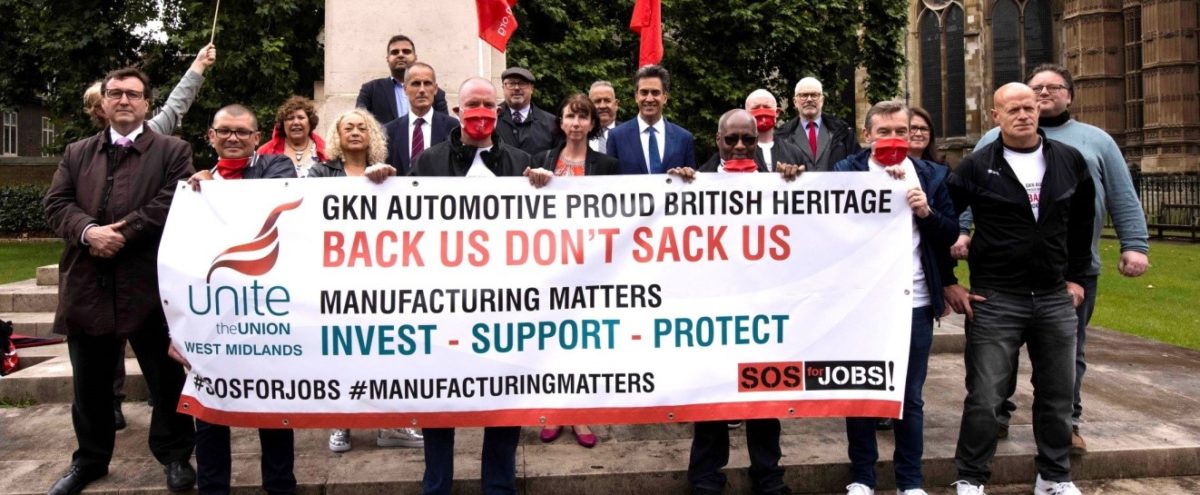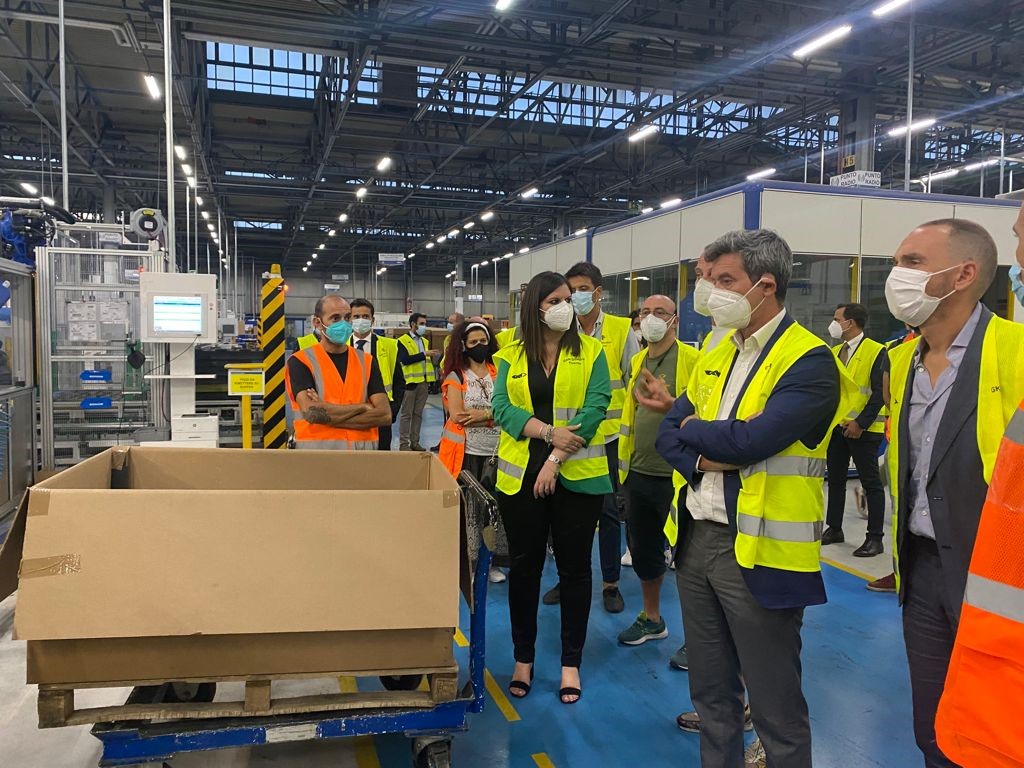Last Saturday 25,000 people came to Florence to support the jobs of over 400 workers after their bosses decided to close the factory in July and relocate the work to Poland. Many of the other workplaces currently in a struggle to save their jobs were present such as Whirlpool workers from Naples who have been trying to keep their factory for several years now. Rank and file independent unions and the left opposition currents to the current union leaderships were also much in evidence. The main banner and slogan of the demonstration was ‘insorgiamo’ (rise up). The leadership at the GKN plant realise that they need the solidarity of other workers across the country so as to force the government to step in and provide support. There is a political understanding that the battle is difficult to win if one workplace stands alone. It is unsurprising that the factory leadership is dominated by a left opposition current to the CGIL FIOM union leadership. All the television and press reported on the demonstration and the struggle has had a real impact on national politics.
At the same time, the GKN management in Birmingham has also decided to shut the plant down and relocate the work. GKN is involved in the automotive industry, making parts. What is revealing is the fact that all these companies talk the talk about the transition to cleaner transport but are quite prepared to sack as many workers as they can along the way. The Unite union in Birmingham has drawn up a transition plan that would save their jobs – perhaps the first since the famous Lucas Aerospace plan decades ago. An all-out strike was called to begin on 27 September but has since been postponed to 18 October pending the outcome of negotiations of ‘all the stakeholders’.

Here is Frank Duffy the Unite convenor at the plant giving some more detail.
More than 500 workers, myself included, at the GKN Automotive factory in Birmingham have voted for strike action to save both our plant and British manufacturing. It’s the last thing we ever wanted to do, but we feel we have been left with no choice.
(…)In 2019, 90% of GKN’s components went into traditional combustion engines, but that may halve by 2025, with electric vehicles (EVs) taking 15% of components and hybrids about 40%. The move to electric will only continue, as UK factories unveil their new vehicle plans before purely internal combustion engines are banned in 2030.
In order to future-proof our jobs and the British automotive industry, we need to transition to producing components for EVs, including new propulsion systems and e-drives. GKN has developed a new e-drive with UK government funding at its Oxfordshire research facility, but sadly we won’t see this innovation creating new green jobs for British workers. Melrose, the owners of GKN, have decided to close our plant in 2022 and move jobs overseas.
We realised that if we want to see a green future for the UK car industry and save our skilled jobs, we couldn’t leave it to our bosses and had to take matters into our own hands. We put together a 90-page alternative plan detailing how we could reorganise production to save money and make these new components.
Ours is the first transition plan for an automotive plant proposed by union stewards in the UK, and an echo of the 1976 Lucas Plan, when shop stewards at Lucas Aerospace, also in Birmingham, proposed converting their plant to socially useful products.
(…) If that isn’t what’s meant by the phrase “just transition”, I don’t know what is. However, Melrose declined to take our plan forward.
Melrose, an investment firm that specialises in buying up and reselling manufacturing businesses, acquired GKN after a hostile takeover in 2018. Our union, Unite, was critical of the takeover at the time, arguing that the company’s track record of seeking to restructure companies that it acquires and sell them on after three to five years meant that it was not a suitable long-term owner.
(…) Five of the 10 constituencies with the highest jobless rates anywhere in the UK can be found in Birmingham. Erdington, the home of our plant, has an unemployment rate of 12.5%, significantly higher than the national average.
Birmingham has been here before. When the massive Rover factory at Longbridge closed in 2005 the impact was felt for years. Unite’s predecessor union, Amicus, supported research which showed that despite 90% of the workers finding alternative employment, 66% were financially worse off, average incomes fell by more than £6,000 and 25% reported being in debt or being reliant on savings to get by.
Every automotive company in the world is gearing up for the transition. The future can’t be built on outsourced or offshored jobs, where workers in different countries are pitted against each other in a race to the bottom.
If we all want to see British manufacturing transition to new environmentally friendly technologies so that there are employment opportunities in the future, we need to retain jobs and skills like ours to make that happen. Support us. We’re fighting for your future too.
Once again we can see that the British state will finance research to help car companies innovate and engage with the transition but there are no guarantees for the people actually building the components. At the same time investment companies like Melrose can buy their way in, often by leveraging debt, and then look to make a quick profit by closing plants and relocating them to countries with cheaper costs. Both in Italy and Britain production is being socially dumped in other countries. Johnson boasts about levelling up and a green transition but the government is standing by and people are being levelled down through redundancy.
The battle in Italy started in July when the bosses there thought they were pulling off a big manoeuvre by proposing a temporary one day closure because of a cancelled customer order. The unions were kept in the dark about a meeting the day before of the board of directors that decided on closure. They hoped the workers could be kept away from the plant, to never come back. The local union leadership did not give up the workplace and mobilised locally and nationally. Although the Draghi government in Italy is as brutally pro-capitalist as the Johnson one here, the political relationship of forces in a ‘national coalition’ and Italy’s remaining labour regulations has allowed the workers there to win the first victory.
The CGIL/Fiom union sent in their lawyers and the local judge agreed with them that the company had broken nationally laid down rules for making redundancies. You have to engage in a series of procedures that explain the reasons and justifications for sacking people. The unions have to be involved at all stages. GKN have to pay all the unions’ legal costs and pay for advertisements in 5 national papers explaining their acceptance of the ruling and their willingness to start new negotiations. Obviously, they cannot rely on the courts to finally save their jobs, that will depend on the strength of the mobilisation locally and nationally. The legal ruling has not banned the sackings but it has been a morale boost and given the factory leadership more time to extend the battle.
A national law is being discussed that will place restrictions on companies moving their production to other countries. The Labour Minister from the moderate PD (Democratic Party), Orlando, visited the occupied GKN factory yesterday. Whilst not having illusions in such ministers the local union leadership has understood the importance of a political approach. During the Covid lockdown, there was a formal national ban on redundancies. It has been recently removed, although some left MPs have called for a new ban given the large number of pending plant closures in which unions, management and government are involved.

Reports in the leftwing newspaper IL Manfesto remarked on the size of the demonstration and its mostly working-class composition. It may herald the beginnings of a fightback around the terms of any Covid recovery. Both the green transition and the Covid recovery plans are prominent in European government’s policies at the present time. Opinion surveys here and in Europe suggest that more people are prepared to consider higher taxes, greater public spending and even a fairer transition than for some time. Scandinavia is back in Social Democratic hands and we could see a victory for the SPD (similar to Labour) in Germany with a possibility of an SPD/Green Government. Surveys by the right-wing Institute of Economic Affairs found as many as 8 in 10 18 to 24-year-old expressing anti-capitalist sentiments. Their anger is driven particularly by housing and the environment.
Even the Johnson government, despite its continued opinion poll lead, is facing potentially greater opposition. The attacks on living standards shown by the cut in Universal Credit, the end of furlough, the increase in National Insurance contributions, the continued cuts in Government grants to Local Authority budgets and the huge increases in heating costs could all spark mobilisations.
Will Johnson’s bluster about Brexit, global Britain and culture wars, alongside pork-barrel spending in former Labour seats, be enough to keep majority support? The question is whether the leadership of the unions or Labour Party are willing or capable of mobilising people in action like the Florentine workers have or draw up realistic green transition plans like the Birmingham union.
Starmer’s rejection of a progressive motion on the green new deal, his focus on buying British or a verbal opposition to hire/rehire or zero-hours contracts will not mobilise a mass opposition. Continuing the war against Corbynism and driving left people out of the party takes him even further away from building any sort of fightback.
Art Book Review Books Campism Capitalism China Climate Emergency Conservative Government Conservative Party COVID-19 Creeping Fascism Economics EcoSocialism Elections Europe Far-Right Fascism Film Film Review Fourth International France Gaza History Imperialism Iran Israel Italy Keir Starmer Labour Party Long Read Marxism Marxist Theory Migrants Palestine pandemic Protest Review Russia Solidarity Statement Trade Unionism Ukraine United States of America War Women


GKN is also closing sites in the USA and Netherlands.